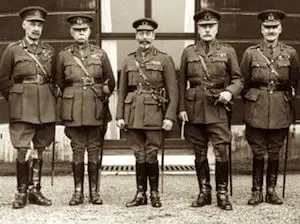This phrase is most commonly used as a description of the British soldiers of WWI.
Lions led by donkeys
What's the meaning of the phrase 'Lions led by donkeys'?
What's the origin of the phrase 'Lions led by donkeys'?
It is widely thought that this expression originated as a reference to the British infantry of WWI (the lions), who were remorselessly sent to their deaths by their incompetence and remoteness of their generals (the donkeys).
The British politician Alan Clark alluded to this when he wrote a history of the war entitled The Donkeys. In that book he attributed the coinage of the phrase to the German soldier Max Hoffmann. That attribution isn’t correct as the phrase, and variations on it, had been in wide use since the mid 19th century.
An early example is found in a newspaper report of the Siege of Sevastopol, 1855. The piece is in the American newspaper The Daily Journal, August 1855:
“It would be expecting too much of human endurance and courage, that forty thousand soldiers should longer maintain themselves against such an enemy, two hundred thousand strong, even though that army be, as the Russians say, “an army of lions led by donkeys.”
Whether or not the phrase is Russian in origin isn’t clear. It crops up in various European contexts in the latter part of the 19th century. It appears in France in this quotation from Francisque Sarcey, in Paris During The Siege, 1871, wrote that the French troops who had been defeated by the Prussians:
“Unceasingly had drummed into them the utterance of The Times: ‘You are lions led by jackasses.'”
The history of “Lions led by donkeys” in printed materials
Trend of lions led by donkeys in printed material over time
Related phrases and meanings
Browse more Phrases
About the Author

Phrases & Meanings
A-Z
A B C D E F G H I J K L M N O P Q R S T UV W XYZ
Categories
American Animals Australian Bible Body Colour Conflict Death Devil Dogs Emotions Euphemism Family Fashion Food French Horses ‘Jack’ Luck Money Military Music Names Nature Nautical Numbers Politics Religion Shakespeare Stupidity Entertainment Weather Women Work
How did we do?
Have you spotted something that needs updated on this page? We review all feedback we receive to ensure that we provide the most accurate and up to date information on phrases.
